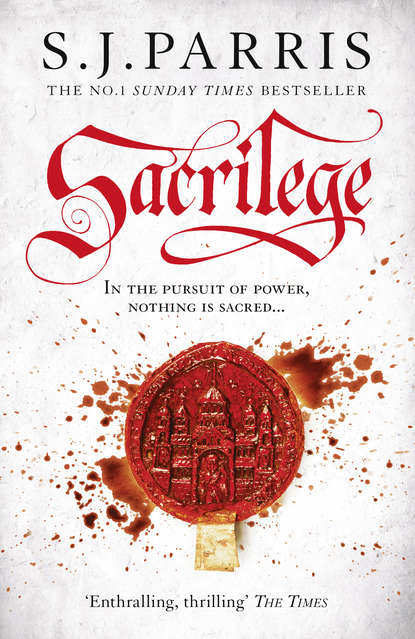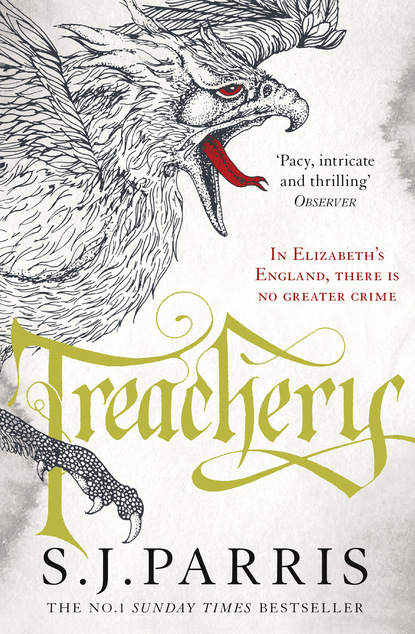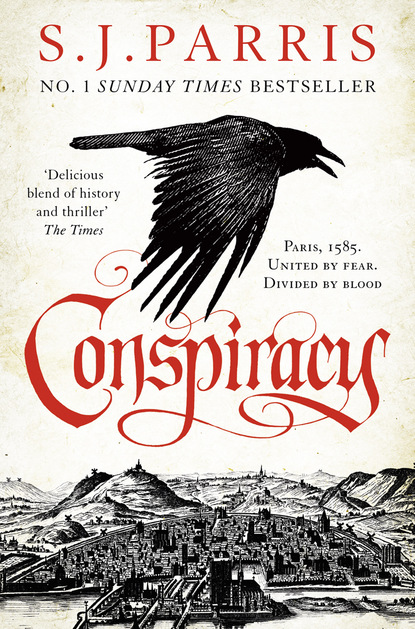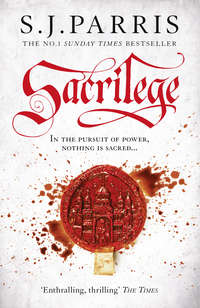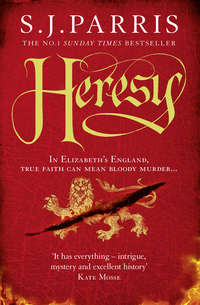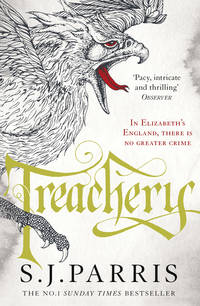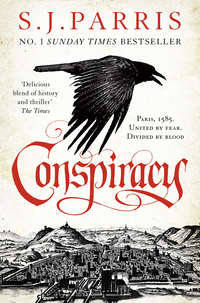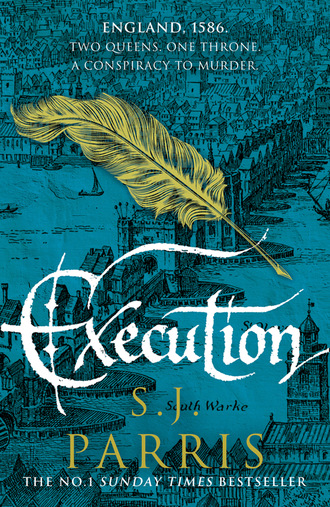
Полная версия
Execution
‘My daughter sometimes believes she sits on the Privy Council,’ Walsingham said drily.
‘I would talk more sense than half the blustering old men there,’ Frances shot back. ‘If the Privy Council and the Parliament were all women, we’d have less money wasted on war and twice as much done.’
Walsingham caught my eye with a half-smile; I tried to picture Elizabeth Tudor seeking the counsel of other women on matters of state. An unlikely scenario; it was well known she commanded most of her courtiers to leave their wives at home in the country so she did not have to share their attention.
‘He had my companion, Clara Poole, working for him in this business of Babington,’ Frances said to me, tilting her head towards her father. ‘It ended badly for her, as you heard. He needs to know why, I want justice for her, and you want employment, so you see, we all want the same thing.’
‘Who is Babington?’
Walsingham lifted his wine glass and studied it without drinking. ‘The ringleader of this little band of would-be assassins is a young blood by the name of Anthony Babington. Catholic, twenty-five, made extremely wealthy by the death of his father last year. Studied in Paris not long ago, remains friendly with known conspirators there, including Mary’s agents. A wife and infant daughter at the family seat in Derbyshire, but spends all his time in London now, throwing himself into the Catholic cause – more out of desire for adventure than ardent faith, I think, but he met Mary Stuart as a youth and has romantic notions of her suffering and her rightful claims.’ He paused, sucked in his cheeks, as if weighing how much more to say. ‘I needed someone on the inside to monitor Babington and his friends without drawing suspicion – it proved difficult to get any of my trusted men close enough. Babington is hot-headed but he is not a fool, and he is understandably cautious about this business. Clara Poole is – was – a beautiful young woman. It seemed an obvious solution.’ He lowered his eyes and looked at the glass turning between his hands, avoiding his daughter’s sharp stare.
‘She was beautiful until they broke her face,’ Frances said, through her teeth. She turned to me, her tone softer. ‘I’ve known Clara since I was ten years old. She was four years older than me, and my father took her and her brother in when they were orphaned. She was my companion for four years until she married at eighteen, but she was widowed a year ago and returned to my household, since her husband had left her without means. I had thought she would work as governess to my daughter when Lizzie was old enough to take lessons. She knew French and could draw beautifully.’ Her voice wavered, and she returned to twisting the napkin between her fingers.
‘Clara’s half-brother, Robin, has been in my service for some time,’ Walsingham said. ‘The Catholics trust him – he has helped import books and relics for them in the past, and served time in prison for it, without betraying that he was my man. They do not know the extent of his work for me – they think he is true to their cause and believe he spies for them. It was an easy matter to have Clara introduced to Babington’s circle. I thought her charms might open doors closed to the men in my employ, and I was not deceived in that.’
‘You sent her – forgive me – to seduce him?’ I stared at Walsingham, thinking of the court in Paris, and the bevy of beautiful, accomplished young women trained by Catherine de Medici, the Queen Mother, to use their wiles in spying on the King’s enemies; I had personal experience of their determination. I had imagined Master Secretary, whose morality leaned towards the puritanical, to be above such methods. Clearly I had been mistaken.
‘Like a whoremaster,’ Frances said, pointedly.
‘Remember to whom you speak, Daughter.’ Walsingham’s tone was stern, but he looked uncomfortable. ‘Clara was willing to be of service,’ he added, to me. ‘We must conclude that certain things are no sin when they are done to save the life of an anointed sovereign, or to protect the state. We must trust that God sees the greater picture.’
‘Just as He does when my father turns the handle of the rack to make a priest confess to treason,’ Frances said, with a flash of triumph in her eyes. I sensed that she enjoyed sparring with her father, and that Clara Poole’s death had given her a licence to do so.
‘Would you have them move freely through the realm instead?’ Walsingham turned to her, his voice wound tight; her provocation was succeeding. ‘If you had seen what I have seen, young lady – you were but four years old when—’
Frances rolled her eyes. ‘When we were barricaded inside the English embassy in Paris on Saint Bartholomew’s night, yes, yes, I have heard this story before, Father. All my life, in fact.’ She sounded like a sullen child.
‘So that you never take it for granted.’ Walsingham leaned back in his chair. I could see that he was forcing himself not to lose his temper. ‘We were a hair’s breadth from being massacred along with all the other Protestants in Paris that night. And if you think the same could not happen in London if Catholic forces invade, you are nothing but a silly girl and not worthy to carry your husband’s name or mine. Sacrifices must be made. Philip knows that. So did Clara. Only you seem to think the world should fall into your lap without cost, and perhaps the blame for that rests with me, and the way I have spoiled you.’
Frances coloured as if she had been slapped. Walsingham breathed out again and clasped his hands, his watchful gaze settling on me.
‘You have risked your life before in England’s service, Bruno,’ he said, quietly. ‘Would you do so again?’
I shifted in my seat. ‘Your Honour, you know I am willing to offer what skills I have to secure England’s freedom, be assured of it. But …’ I hesitated, spread my hands. ‘I am a philosopher. I’m not sure I am equipped for the task you mention. Besides, I have a teaching job in Paris, I am expected back—’
At this, Walsingham chuckled. ‘Ah, yes. The Collège de Cambrai. And how does that suit you?’
‘It’s …’ I scratched the back of my neck. It was impossible to guess quite how much Walsingham knew. ‘A prestigious position. King Henri himself arranged it for me.’
‘To keep you away from court after that episode last Christmas,’ he said, without missing a beat. ‘And does it satisfy your taste for adventure – arguing with undergraduates?’
‘It gives me an income, Your Honour.’ I could not quite meet his eye.
‘Hmm. Thomas?’
Phelippes looked up and blinked. ‘Last month you gave a lecture in which you spoke against Aristotle and the ensuing debate ended in a mass brawl which had to be broken up by the city authorities. One student was left with a cracked jaw and another with a dagger wound. They made a formal complaint. You received an official warning from the university. Since then, you have been corresponding with Professor Alberico Gentili at the University of Wittenberg, and making secret plans to travel there.’ He recited this as if reading from an official report.
I looked at him; it was not even worth asking how he knew all this. It was true that I had intended to move on to Wittenberg at the end of the summer, but I had told no one.
‘Gentili works for me,’ Walsingham said, by way of explanation. ‘I take an interest in your movements, Bruno – that should not surprise you. Once a man has been in my employ, he becomes part of a family, so to speak. Tell me honestly – would you not rather return to the service of the Queen of England, and earn her gratitude?’
Damn him. I watched him watching me; he knew so precisely how to find a man’s weakness. Queen Elizabeth’s patronage would be a prize more valuable than any other monarch’s, since in England I had greater freedom to publish my controversial books than anywhere else in Europe. But if she had not offered it the last time I was here, after the service I had done her, I was not convinced that finding another killer would persuade her this time. I wondered if the Queen even knew of Walsingham’s intricate scheme to bring her cousin Mary to the block. Somehow I doubted she would approve it.
‘Her Majesty was much taken with your writing,’ he continued, pushing the decanter of wine down the table towards me. ‘She would be intrigued to read more, I think. I could certainly arrange that.’
I ran my tongue around my teeth to find my mouth dry. ‘I had hoped to finish a new book in Wittenberg this summer,’ I said, and heard how feeble the excuse sounded. ‘Gentili has offered—’
‘He has offered you a place there, I know. You could still take it up in the autumn, if you would spend a few weeks here and do me this one favour. I will write to Gentili – he will understand.’
I took a long drink of Walsingham’s good wine, tilting the glass so that the liquid glowed ruby in the candlelight and the Murano crystal shimmered as if it were made of nothing but air. Finally I raised my head and met his eye. I had run out of excuses.
‘What would you have me do?’
FOUR
Lady Sidney gave a little squeal of delight and sat back in her chair, clasping her hands together. Walsingham continued to study me, his face grave. At length, he turned to his daughter.
‘You have your wish, Frances. Now you must leave this in my hands, the details are not for your ears. And make no mention of Bruno’s coming here in your letters to Philip, unless you want to compromise the whole business.’
‘I am not a fool, Father.’ Her lip curled with scorn as she pushed her chair back. ‘Do you forget I was born to double-dealing?’ She stood and turned to me, bobbing a brief curtsy. ‘Give you good night, Bruno. And thank you. I am more grateful than you can know.’
Born to double-dealing, I thought, as the door clicked shut behind her. It was a phrase I had heard before; Walsingham had used it of Charles Paget, whose father, Lord Paget, had been spymaster to Queen Elizabeth’s father, the last King Henry. What must it be, to grow up in a world where counterfeiting is a language you learn from childhood, and everyone you know wears at least two faces? I had developed a grudging respect for Paget in my encounters with him, though I knew he would have let me die without a second thought if it had suited him.
‘Bruno? Are you with us?’
I shook myself free of memories and focused on Walsingham at the other end of the table. I noticed again how thin his face had grown.
‘At your service, Your Honour. You need to know who killed Clara Poole. I suppose you assume it was this Babington or one of his associates?’
He rubbed a hand across his beard and paused before answering.
‘I need more than that. Clara was my most trusted source on the inside of that plot. She delivered intelligence reliably on their intentions – it was how I could be sure the business was not advancing beyond my ability to control it. You can imagine how carefully this must be balanced.’
I nodded. No wonder he looked as if he didn’t sleep. It was one thing to allow an assassination plot to unfold in order to entrap Mary Stuart in an act of treason; quite another if that plot should succeed because he failed to monitor it closely enough. ‘Does the Queen know of this Babington conspiracy?’
‘No.’ His face darkened. ‘And she will have no need to, until it is all set down on paper and her royal cousin on trial, if our skill and God’s Providence serve. I have one other reporting to me from among the conspirators, but lately I am not certain his loyalty is wholly mine. I need someone’ – he raised a forefinger and levelled it at me – ‘to join Babington and his friends. Find out why Clara was killed. I have no doubt that one among them suspected her – but I need to know if all were behind her murder, or one took it upon himself to act alone, and how much each one knows. If they think she betrayed their plot, they may change tactics, or put it off until a later date, and that we cannot afford. I don’t have that kind of time.’ He broke off and reached for his glass, coughing as he swallowed.
‘Your Honour –’ I leaned forward, alarmed – ‘are you ill? I hope you don’t mean—’
‘Look at me, Bruno.’ He slumped back in his chair, drained. ‘The spirit is willing, but the flesh is weak. So damnably weak, and growing weaker by the day. If any apothecary could make me a philtre that would wind the clock back ten years, I would sell everything I own to buy it.’ A ghost of a smile flickered over his lips. He examined the backs of his hands and did not meet my eye. ‘I have given the best of my energies to keep this realm safe, free and Protestant, and I will do so until my last breath, but I can’t go on like this forever. I must and will see the Queen of Scots brought to the block as my last act of service to Elizabeth.’ One hand curled into a fist. ‘With her death, England’s enemies will be scattered. Then I could close my eyes with a degree of peace.’
They would soon regroup, I thought. Instead I said, ‘Your Honour, I hope and pray these fears are premature. You are only—’ I stopped to calculate his age. Barely old enough to be my father, though in some ways I had come to think of him in that role.
‘This is my fifty-sixth summer, Bruno.’ He sat up straighter, toying with the stem of his glass.
‘Well, then. Unless a physician has told you otherwise, there is no reason to think you will not go on serving the realm for another three decades.’ I tried to sound buoyant, but his eyes clouded.
‘I need no physician to tell me what I feel in here.’ He struck his chest. ‘But enough self-pity. I tell you only so that you understand the urgency. I must know why Clara Poole was killed, and what Babington will do next. This Jesuit priest Mendoza is sending to join the conspirators …’
‘What of him?’
‘You will be him.’
I had guessed this was where he was tending. I closed my eyes to escape his intense stare.
‘Your Honour, it’s impossible that I could pass myself off as this man without suspicion. I am known in London—’
‘Not as well as you think,’ he cut in. He had clearly anticipated this objection. ‘It is almost a year since you were last here. You were known at the French embassy when you lodged there, I grant, but since Ambassador Castelnau was recalled to Paris, his household staff returned with him and it’s not as if the new ambassador has your portrait hanging over the mantel. There are few Londoners who could identify you if they passed you in the street.’
‘I am known by some at court,’ I said feebly.
‘Your name is known in select circles, perhaps. But you will not be going by your own name, and it is no great work to change your appearance. Besides, you will be nowhere near the court – Babington’s group hide themselves in taverns and brothels, and meet in lodging houses. There is no reason anyone should connect this Spanish Jesuit with the Italian scholar Giordano Bruno, if you remember not to provoke arguments about Aristotle.’
I noted the glint of humour in his eye.
‘We don’t know anything about this Jesuit. He could be seventy years old. He could be famous for having one leg. Ballard might have met him already in Paris, for God’s sake – they would know I was an imposter the minute I walked through the door.’
Walsingham straightened, a knowing smile creasing his face. ‘I doubt Mendoza would send a man of seventy, or one hampered by the loss of a leg, but these are matters we can check. There’s no evidence from Paget’s letter that either he or Ballard have met this man. There is only one person among the conspirators who would know that you are an imposter.’
‘Then the plan is over before it is begun, if one of them knows me. Who?’
‘You’ll enjoy this. The only associate of the Babington group who will know you’re not the priest is Master Gilbert Gifford.’
‘Gifford?’ I stared at him, incredulous. I had encountered Gifford in Paris the previous autumn; a gawky, anxious youth whose father had been imprisoned for refusing to recant his Catholic faith, and who harboured romantic notions of overthrowing Elizabeth and her government, like every other angry young Englishman who fetched up in France. ‘I warned you about him before Christmas. He was planning to return to England carrying secret letters for Mary Stuart from Paget and his circle in Paris.’
‘And thanks to your warning, he was intercepted by Richard Daniel in Rye,’ Walsingham said, looking pleased with himself. ‘Daniel rode to London to bring the boy to me in person. With a few judicious incentives, young Gifford was persuaded to see that his best interests lay with England’s cause and not Mary Stuart’s.’
‘You didn’t torture him?’ The thought of Walsingham’s methods of persuasion turned my gut cold; I had no great affection for Gilbert Gifford, but he had struck me as foolish and easily manipulated, rather than dangerous.
Walsingham gave me a reproving look. ‘Good God, no. I am not a monster, whatever my daughter may think. Torture a creature like Gifford? I had as well take a sword to a kitten. No – he had enough on him when he arrived in Rye for me to throw him in the Tower on the spot, and he knew it. Not only the letters to Mary promising foreign support for her claim to the throne, but – can you credit it – a copy of a new papal bull of excommunication against the Queen.’ He shook his head at the audacity. ‘And woefully badly concealed. Gifford was on his knees begging for a reprieve before I said a word, ready to promise anything. So I offered him his liberty if he would continue in his role as courier to Mary, but under my direction.’ He paused, allowing me to appreciate the achievement. ‘To sweeten the deal, I released his father from prison as well. The old man was in the Counter almost a year for recusancy. The family has lands and a manor house in Staffordshire, you see.’
I shook my head, failing to see the significance.
‘Mary has been transferred to Chartley Manor, nearby,’ he said, impatient. ‘So Gifford may take her correspondence while making visits to his family home, without arousing suspicion. It is the perfect cover, and the conspirators believe it is all down to their ingenuity. For the present, Mary Stuart thinks Gilbert Gifford is her saviour.’
‘And this Babington group – they trust him too?’
‘Implicitly. He came with personal letters of recommendation from Charles Paget in Paris, and Mary has vouched for him.’
‘Forgive me, Your Honour, but you have said yourself that these men are not stupid. They are in regular correspondence with Paget, who keeps a close eye on me. It will not take him long to notice I have left Paris. And what happens when the real Jesuit priest turns up?’
He chuckled. ‘He will not make it past the searchers, trust me. While you were resting, Thomas and I dispatched fast riders to all the southern ports giving them warning – the Jesuit must be expected any day now, posing as the son of a cloth merchant, according to Paget. The minute they have him, he will be brought safely to Barn Elms, where we can count his limbs and he can tell us everything we need to know to make your performance convincing. I assume you have Spanish among your languages, growing up in Naples?’
‘Of course. It was the language of the nobility when I was educated at San Domenico. A Spaniard might detect a Neapolitan accent, though I am fluent enough to convince Englishmen. But—’
‘Excellent.’ The smile crept back. ‘Don’t worry about Paget. We will put the word out in Paris that you have taken a trip to Wittenberg.’
‘What will you do with this Jesuit while I am impersonating him? You will not kill him?’ I tried not to think about how the Spaniard would be persuaded to share his information. It was said that any prisoner suspected of possessing intelligence too sensitive to be heard even by the torturers at the Tower was taken under cover of darkness to Walsingham’s country house near Mortlake, where he would conduct the interrogations himself in his cellar.
‘The Jesuit will be my concern,’ he said, with a snap of finality. He folded his hands together and leaned closer. ‘But you must tell me now if the business makes you squeamish. Once it is begun, once you are in with them, you must see it through to the end. If you waver, if you hesitate even once and they suspect you, they will kill you. They have too much at stake. We have already seen what they will do to a woman.’ He held my gaze, unblinking. ‘And you have a tender conscience, Bruno – I have noted this in you before. As a man, it is a virtue that does you credit. As an agent, it could be your undoing. In this occupation, one is sometimes required to override conscience with duty, just as a soldier on the battlefield must.’
‘I have watched a man die a traitor’s death, Your Honour,’ I said quietly. ‘What you are asking of me – to befriend these men, eat with them, earn their trust, all to bring them to the scaffold – it is no small thing. Anyone with a conscience would think twice.’
‘I expect you to think twice. But remind yourself that these men want to kill an anointed queen.’
‘So do you.’
I saw his fingers flex, but his voice remained level. ‘I wish to convict a traitor who conspires against England on the side of foreign invaders. What title she claims is not at issue. These people do not deserve your sympathy, Bruno. But if you need further convincing, I am happy to oblige. Marston!’ He scraped back his chair and stood as he called out. The steward appeared with remarkable speed, leading me to suspect he had remained right outside the door. It was not my concern if Walsingham’s servants eavesdropped, I tried to tell myself, but there was no avoiding the knowledge that, if I accepted this commission, everything surrounding it could mean the thin sliver of difference between life and death. I had seen before what could happen when a man trusted his servants unquestioningly.
‘Prepare the carriage with no livery,’ Walsingham said. ‘Fetch my cloak too, and tell the servants to bring Bruno’s bags.’
Marston nodded and left the room. Walsingham turned to me. ‘You can stay with Thomas tonight in Leadenhall. Best you keep away from my house, in case you are seen. We will take you there on the way back.’
‘Back from where?’
‘You will see.’ He set his mouth in a grim line. ‘I want you to know the men you are dealing with, before you make your decision. I would also value your shrewd eye.’
I could barely keep my shrewd eyes open by this point, but I rose, gave a small bow and followed Phelippes along the corridor to a back door that gave on to a neat courtyard and kitchen garden. Cloaks and bags were brought, and we were led out to the tart chill of the summer night, the light almost gone, a fading scent of roses and woodsmoke on the air. I breathed in; I guessed at what Walsingham meant to show me, and I wanted to inhale the freshness of the night and hold it deep in my lungs against what was to come.
FIVE
‘There is one thing I do not understand,’ I said, bracing myself against the seat as the carriage jolted along a rutted track. Black cloth hung at the windows so I had no idea of where we were; only that we had been travelling for more than half an hour and had passed outside the city walls – we had made a brief stop while Phelippes descended and I had caught the exchange of voices before the scrape and creak of gates opening. But no one had offered any further information and we had bumped along in silence until now, Walsingham’s brooding expression forbidding unnecessary questions.
He raised his head from his thoughts and nodded for me to continue.
‘You’ve had Mary Stuart in custody for nearly twenty years. If you want so badly to be rid of her, why don’t you slip something into her food? She could die quietly of an unexplained illness, without all this need for elaborate trickery and conspiracies and the spectacle of a trial with all of Europe watching.’
His shoulders slumped as a sigh escaped him and I saw him exchange a glance with Phelippes.
‘Do you suppose this has not been considered?’ He sat back. ‘You tell him, Thomas – I am weary of making this argument. I have it with the Queen at least once a week. She favours your method, Bruno. If she could have Mary dead without sullying her own hands or her conscience, she would sleep easier than she has in two decades. So she claims.’


